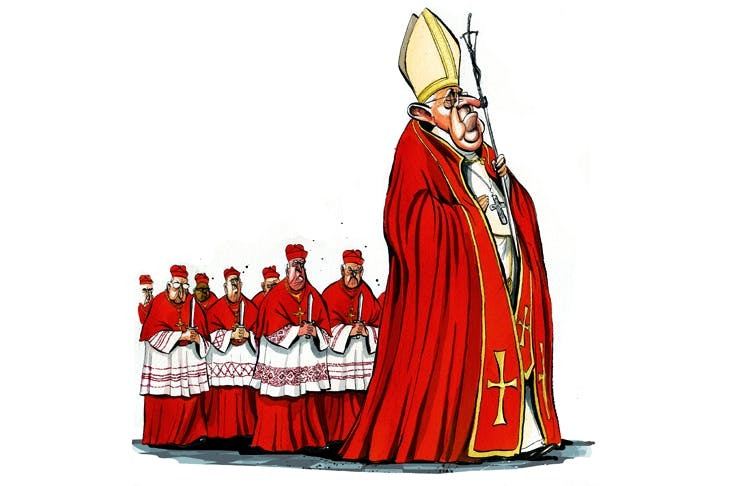Hell is a hell of a problem. Eternal punishment of the damned is a basic dogma of the Catholic Church and most other forms of Christianity. But the Bible has surprisingly little to say about it, and philosophers have struggled for millennia to give a rigorous account of what hell would really mean. Without reason or revelation giving a clear picture, hell has been left to the popular imagination to fill in with scenes of devils either scary or absurd poking people with their pitchforks.
So when it was reported in the past week—Holy Week, no less—that Pope Francis had denied the existence of hell when asked about the fate of “bad souls” by a 93-year-old atheist, the news had certain plausibility, and not just for right-wing Catholics who view Francis with the utmost suspicion. According to the pope’s non-believing nonagenarian friend, the Italian journalist Eugenio Scalfari, Francis said the wicked “are not punished. Those who repent obtain God’s forgiveness and take their place among the ranks of those who contemplate him, but those who do not repent and cannot be forgiven disappear. A hell doesn’t exist, the disappearance of sinning souls exists.”
It seems like something Pope Francis might say, at least the revolutionary Pope Francis of left-wing hopes and right-wing fears. The Vatican’s response, noting Scalfari’s age and atheism and his habit of reconstructing conversations from memory rather than taking notes or making recordings, cast doubt on the story without helpfully clarifying what the pope actually did say. The pontiff’s critics must for now take his orthodoxy on faith—which, to be sure, is what they must always do, if they don’t aspire to be Protestants. The Catholic Church is not a democracy.
The Catholic catechism affirms the existence of hell, but it does not delve into the fantasies of Sadean torture in which many a populist preacher has reveled. The chief feature of hell is its supreme remoteness from God and all love. There is “eternal fire,” but no pitchforks. What other punishments hell might hold is obscure, and the Bible throws little light on the question. Beyond its imagery of flames, it presents damnation mostly in the language of death, as in Saint Paul’s remark about “the wages of sin.” If souls are immortal, “death” has to mean something other than death, and it’s not unlikely that Francis was attempting, and perhaps failing, to explore this difficulty when Scalfari took him to be saying that hell was not real and annihilation was all that awaits the damned. But who am I to say?
Yet there is something else to be considered here beyond the ambiguities of high theology and Italian journalism. Hell serves a political purpose for many people, not all of them Christians, who believe, whatever their personal faith may be, that it’s important for other people believe in eternal punishment so they’ll behave well in this world. Plato, in the Crito, has Socrates refuse a chance to escape the death penalty that has been imposed on him by the laws of Athens, in part, Socrates says, because “the laws in the world below” will be waiting for him. In the centuries since then, the notion of hell as indispensable for good citizenship has fallen into disfavor with enlightened minds, even as it has become an article of faith for reactionaries. Pope Francis therefore committed a double heresy in the eyes of the Catholic right—not only transgressing the Church’s doctrines, which may be the main thing, but also abandoning a useful truth where social order is concerned.
Without hell, would the masses refrain from cannibalism? Maybe the elite can get by with rational self-interest, but doesn’t the man in the street need the threat of Satan roasting him on a spit to keep him from gambling, fornicating, and being a bad bourgeois? In this light, even if Pope Francis was not really denying Catholic dogma—and he wasn’t—he was undermining morality just by getting too sophisticated about it. It’s actually better, from the reactionary’s point of view, if people believe in a crude caricature of hell, lest the real thing be insufficiently terrifying to those who don’t understand what it means to be exiled from God’s love.
The pope might have confused Scalfari, but the pope’s critics are themselves characteristically confused. Hell should not be a myth with which to manipulate the masses, and in political terms the people who need to contemplate their damnation the most are precisely those at the top who are governed by rational self-interest. They lead outwardly impeccable lives, as clean as the whitest sepulchre. Hell is for them, and what they need fear is its most metaphysical reality. If they knew what Pope Francis’s words truly meant, even as misreported by Scalfari, they would already feel the flames.

























